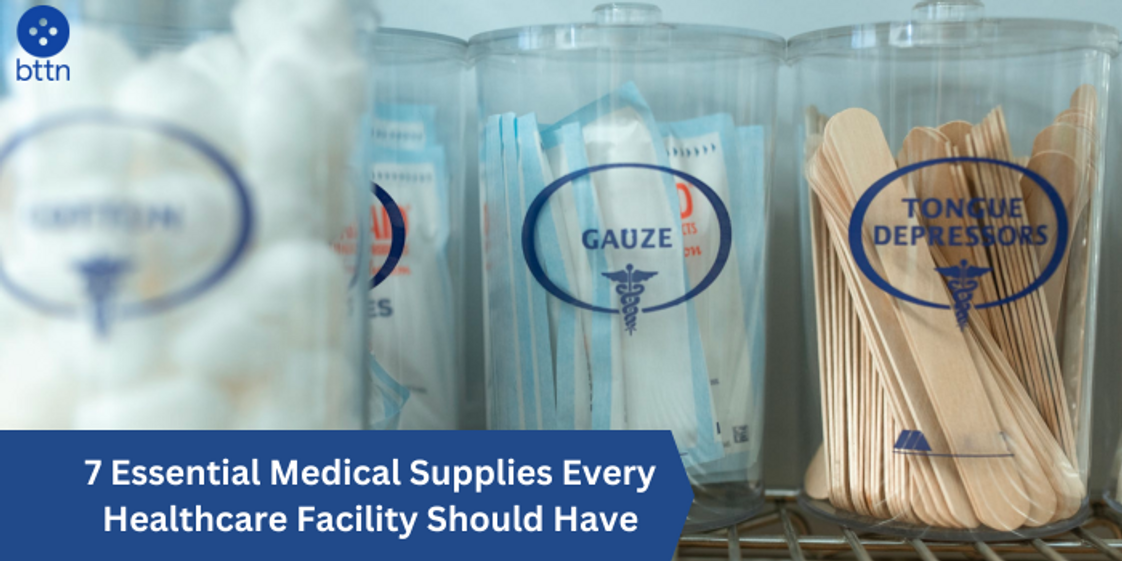
7 Essential Medical Supplies Every Healthcare Facility Should Have
Posted by Pankaj Dhiman on Jan 2nd 2024
In the fast-paced world of healthcare, preparedness is key. Whether you run a bustling hospital, a cozy clinic, or a specialized treatment center, having the right medical supplies on hand is crucial for delivering efficient and effective care. But with a seemingly endless array of products available, it can be overwhelming to know where to begin.
Worry not, healthcare heroes! This comprehensive guide dives into the top 10 essential medical supplies every healthcare facility in the USA should have in 2024. From life-saving equipment to everyday essentials, we'll equip you with the knowledge and confidence to ensure your facility is always stocked and ready to tackle any medical challenge.
Must Read: What are Urinal Drain Bags? Benefits, How to Use, and Applications
1. Personal Protective Equipment (PPE): Your First Line of Defense
Protecting both patients and staff from the spread of infections is paramount. A well-stocked PPE arsenal should include:
- Gloves: Latex, nitrile, and vinyl options for various procedures and sensitivities.
- Masks: Surgical masks for routine care and N95 respirators for high-risk situations.
- Gowns: Disposable and reusable options for infection control during examinations and procedures.
- Face shields: Additional barrier protection for eyes, nose, and mouth.
- Eye protection: Safety glasses and goggles for splash protection during procedures.
2. Vital Sign Monitoring Equipment: Keeping a Pulse on Patient Health
Accurate and timely monitoring of vital signs is essential for early detection of potential complications. Invest in:
- Thermometers: Digital and non-contact options for efficient temperature checks.
- Blood pressure monitors: Manual and automatic models for various patient needs.
- Pulse oximeters: Non-invasive devices to measure oxygen saturation in the blood.
- Electrocardiogram (ECG) machines: Portable and stationary units for recording heart rhythm and electrical activity.
3. Wound Care Essentials: Healing with Confidence
From minor cuts to complex surgical wounds, your facility needs a comprehensive wound care kit:
- Bandages: Sterile gauze pads, adhesive bandages, and specialized dressings for different wound types.
- Antiseptics and disinfectants: Iodine, alcohol, and other solutions to clean and prevent infection.
- Sutures and needles: Various sizes and types for wound closure.
- Wound irrigation solutions: Saline and other solutions to cleanse and flush wounds.
Must Read: Wound Care: Bandages, Gauze, Medical and Surgical Tape, and Wound Dressings
4. Emergency Response Equipment: Be Prepared for the Unexpected
Being ready for emergencies is crucial for saving lives. Ensure your facility has:
- Automated External Defibrillators (AEDs): Easy-to-use devices for delivering electric shocks to restore normal heart rhythm.
- Emergency airway equipment: Bag-valve masks, laryngoscopes, and endotracheal tubes for airway management.
- Spinal immobilization devices: Backboards, cervical collars, and straps for stabilizing patients with suspected spinal injuries.
- Oxygen tanks and regulators: Portable and stationary oxygen supplies for patients with respiratory distress.
Must Read: Infection Control: The Ultimate Guide to Preventing Infections
5. Medication Management: Delivering Treatment Accurately
Proper medication storage, dispensing, and administration are vital for patient safety. Stock up on:
- Medication carts: Secure and mobile units for storing and transporting medications.
- Medication dispensing systems: Automated or manual systems to ensure accurate and timely medication delivery.
- Syringes, needles, and vials: Various sizes and types for different medication administration routes.
- Sharps containers: Safe disposal containers for used needles and syringes.
Must Read: Bttn - Your No.1 Medical Supplier in the USA | Quality Medical Supplies
6. Basic Medical Instruments: The Tools of the Trade
From routine examinations to minor procedures, certain instruments are indispensable:
- Stethoscopes: For auscultating heart and lung sounds.
- Otoscopes and ophthalmoscopes: For examining ears and eyes, respectively.
- Reflex hammers: For testing nerve reflexes.
- Tongue depressors: For facilitating oral examinations.
- Scissors and forceps: For various medical procedures.
Must Read: IV Infections: Understanding the Risks, Signs, and Prevention
7. Infection Control Supplies: Keeping the Environment Clean
Maintaining a clean and hygienic environment is essential for preventing the spread of germs. Equip your facility with:
- Disinfectants and wipes: Effective solutions for cleaning surfaces and equipment.
- Hand sanitizer: Alcohol-based sanitizer for frequent hand hygiene.
- Medical waste disposal containers: Proper disposal of biohazardous materials.
- Personal protective equipment (PPE) for cleaning staff: Gloves, gowns, and masks for safe handling of contaminated materials.
Must Read: Urinary Catheters: Uses, Types, and Complications
